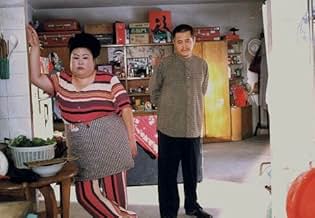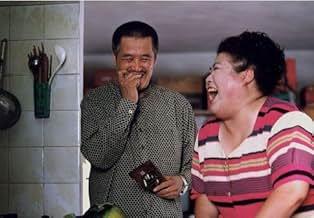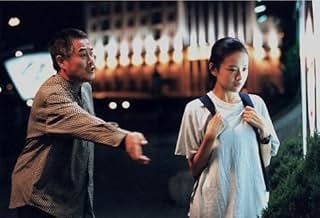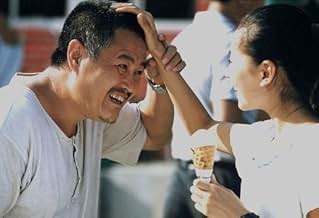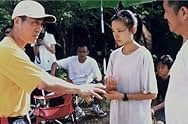VALUTAZIONE IMDb
7,3/10
4264
LA TUA VALUTAZIONE
Zhao è un anziano scapolo che non è stato fortunato in amore. Pensando di aver finalmente incontrato la donna dei suoi sogni, Zhao la porta a credere di essere ricco e accetta un matrimonio ... Leggi tuttoZhao è un anziano scapolo che non è stato fortunato in amore. Pensando di aver finalmente incontrato la donna dei suoi sogni, Zhao la porta a credere di essere ricco e accetta un matrimonio ben oltre le sue possibilità.Zhao è un anziano scapolo che non è stato fortunato in amore. Pensando di aver finalmente incontrato la donna dei suoi sogni, Zhao la porta a credere di essere ricco e accetta un matrimonio ben oltre le sue possibilità.
- Regia
- Sceneggiatura
- Star
- Premi
- 5 vittorie e 4 candidature totali
Recensioni in evidenza
Yimau Zhang takes us along for a ride to explore how things seem to have changed in China. The country has given a step forward into the modern age as it shakes off its rigid past, adopting new ways in doing things. In fact, the country appears to have developed its own take on capitalism, as we watch a new prosperous, and aggressive China, transformed in ways we had not envisioned before. Mr. Zhang's film is an allegory about his country.
The main idea in the film is how Zhao, a factory worker, sets his eyes on a plump and attractive woman to get married. The woman, in turn, has her own ideas of what to expect from this man who lies to her and makes himself pass for a hotel manager. Thinking this is the case, the lady friend proposes he employs her stepdaughter, a blind girl that has been abandoned by her father, who has decamped to another city.
Zhao, who wants to keep the girlfriend happy, decides to take Wu Ying to work at his hotel, which in reality is a bus, that he and his buddy have converted in a lovers' motel, in a park. But before he can do anything, Zhao watches in horror as how some cleaning crews are taking his livelihood away because they are beautifying the area. Zhao is stuck with Wu Ying, so he takes her to his own humble apartment.
Zhao and his friends from the factory devise a plan to convert space in the dilapidated building a massage parlor so that the blind girl can work. The only thing, there are no clients, and only Zhao's friends are enrolled to tip the young woman using Zhao's own money.
The film is a delightful comedy about how being entrepreneurial backfires on the well intentioned man. The blind girl, Wu Ying, knows much more than what Zhao and the rest give her credit for, and unfortunately, everything ends badly, except for the blind girl, who recognizes the kindness of his mentor, who doesn't get to know first hand of her gratitude because fate intervenes.
"Happy Times" is a charming film that works thanks to the light touch by the director. Benshan Zhao, who has been seen in other Chinese films is excellent in the role of Zhao. Jie Dong plays Wu Ying with conviction and Lifan Dong, is the stepmother, who discovers the duplicity of her would be husband.
Recommended to all Yimou Zhang's fans who might have missed its commercial run.
The main idea in the film is how Zhao, a factory worker, sets his eyes on a plump and attractive woman to get married. The woman, in turn, has her own ideas of what to expect from this man who lies to her and makes himself pass for a hotel manager. Thinking this is the case, the lady friend proposes he employs her stepdaughter, a blind girl that has been abandoned by her father, who has decamped to another city.
Zhao, who wants to keep the girlfriend happy, decides to take Wu Ying to work at his hotel, which in reality is a bus, that he and his buddy have converted in a lovers' motel, in a park. But before he can do anything, Zhao watches in horror as how some cleaning crews are taking his livelihood away because they are beautifying the area. Zhao is stuck with Wu Ying, so he takes her to his own humble apartment.
Zhao and his friends from the factory devise a plan to convert space in the dilapidated building a massage parlor so that the blind girl can work. The only thing, there are no clients, and only Zhao's friends are enrolled to tip the young woman using Zhao's own money.
The film is a delightful comedy about how being entrepreneurial backfires on the well intentioned man. The blind girl, Wu Ying, knows much more than what Zhao and the rest give her credit for, and unfortunately, everything ends badly, except for the blind girl, who recognizes the kindness of his mentor, who doesn't get to know first hand of her gratitude because fate intervenes.
"Happy Times" is a charming film that works thanks to the light touch by the director. Benshan Zhao, who has been seen in other Chinese films is excellent in the role of Zhao. Jie Dong plays Wu Ying with conviction and Lifan Dong, is the stepmother, who discovers the duplicity of her would be husband.
Recommended to all Yimou Zhang's fans who might have missed its commercial run.
This one's up to Zhang Yimou's usual standard, and like his other movies, revolves around an unfortunate female, in this case a young blind woman. Set in modern urban China, this movie often has a lighter touch than most of his others. Although the movie credits cite a story by Mo Yan, "Shifu, You'll do Anything for a Laugh" as the basis of the movie, the connection is highly tenuous, borrowing little more than the main character from that short story; namely, a middle-aged, laid-off factory worker, played by Zhao Benshan (best known to Chinese audiences as a comedic actor). The economic changes in modern China form the background to his relationship with the blind girl he finds himself thrown together with as he tries to court her step-mother.
I'd like to see someone pick this one up for distribution and given a better English title.
I'd like to see someone pick this one up for distribution and given a better English title.
This film will either get to you like a death in the family, or leave no lasting impression on you whatsoever. I'm among those who fit in with the first part. Maybe family death is exaggerating but that doesn't matter, this is still A VERY POWERFUL FILM. This film proves that ZHANG YIMOU IS THE BEST DIRECTOR ALIVE (as Alferd Hitchcock and Akira Kurosawa are dead). The best actor in this film is actually the blind girl (sure, she's no River Pheonix, but who is?) who always gives you the impression that she's blind (unlike some American actors in American films). Yet she happens to know more than you think in the end (no spoilers on that). To see this film on the big screen was too much, 10 out of 10. Oh, and watch out for Hero, from the same director of this.
There is no doubt in my mind that Zhang Yimou is one of the world's finest film makers. He manages to straddle the bounds of both art house and commercialism with his catalogue of works that show a beauty and grandeur that often earns the description "painterly", whilst also telling a really good story. Happy Times is something of a departure from works like Raise The Lantern and Shanghai Triad, being a fairly realist comedy.
Happy Times ("Happy Times Hotel" on the print) is about a group of 'retired' (laid off) factory workers who conspire to hoax a young blind girl. Not as callous as it sounds though, as their intentions are relatively good. The main characters are a 50 year old bachelor (Zhao Benshan) and the blind girl herself, played by newcomer Dong Jie. A small crowd of interesting friends and the gargantuan love interest/stepmother of the leads pad out the cast, which mostly plays out in a couple of small locations - two cramped flats, a sprawling abandoned warehouse, and a delapidated bus.
It's very much a character piece, focussing mainly on the relationship that develops between Zhao Benshan and Dong Jie, thrust together under circumstances that neither planned. It's a tender story... a little bit happy, a little bit sad. Bittersweet I guess, but only slightly bitter.
Zhang Yimou forgoes his usual luscious cinematography for quite a naturalistic feel. Apparently he used "hidden cameras" to shoot some of it, but I've no idea what that means (maybe the street scenes?). It's quite a simple piece, a light 95 minutes long, yet still crafted with the dexterity and care that Zhang Yimou always brings to a film. Being a character piece, it is very much dependent on the performances for success - Zhang could coax an oscar winner out of a mannequin, but Dong Jie here is especially good. If I hadn't seen her walking around the theatre unattended, I would certainly have believed she was genuinely blind (this is not an easy thing to act), and her emotional expression is spot on too. You couldn't possibly not care for her character, or that of Zhao Benshan.
The movie might be quite 'slight' in Zhang Yimou's filmography - it's unlikely to win any oscars for him, but it is a nicely made movie that I think everybody can enjoy.
Happy Times ("Happy Times Hotel" on the print) is about a group of 'retired' (laid off) factory workers who conspire to hoax a young blind girl. Not as callous as it sounds though, as their intentions are relatively good. The main characters are a 50 year old bachelor (Zhao Benshan) and the blind girl herself, played by newcomer Dong Jie. A small crowd of interesting friends and the gargantuan love interest/stepmother of the leads pad out the cast, which mostly plays out in a couple of small locations - two cramped flats, a sprawling abandoned warehouse, and a delapidated bus.
It's very much a character piece, focussing mainly on the relationship that develops between Zhao Benshan and Dong Jie, thrust together under circumstances that neither planned. It's a tender story... a little bit happy, a little bit sad. Bittersweet I guess, but only slightly bitter.
Zhang Yimou forgoes his usual luscious cinematography for quite a naturalistic feel. Apparently he used "hidden cameras" to shoot some of it, but I've no idea what that means (maybe the street scenes?). It's quite a simple piece, a light 95 minutes long, yet still crafted with the dexterity and care that Zhang Yimou always brings to a film. Being a character piece, it is very much dependent on the performances for success - Zhang could coax an oscar winner out of a mannequin, but Dong Jie here is especially good. If I hadn't seen her walking around the theatre unattended, I would certainly have believed she was genuinely blind (this is not an easy thing to act), and her emotional expression is spot on too. You couldn't possibly not care for her character, or that of Zhao Benshan.
The movie might be quite 'slight' in Zhang Yimou's filmography - it's unlikely to win any oscars for him, but it is a nicely made movie that I think everybody can enjoy.
Zhao is a 50 year old unemployed loser making one last attempt at finding love. He courts a portly divorcee, but keeps having to lie to pass himself off as a better catch than he really is. Eventually, of course, the lies backfire. Zhao tells his sweetheart that he is the manager of a fancy hotel. She responds by foisting her blind stepdaughter off on him, confident that he can easily find her employment at his fancy hotel.
What follows is a funny, unlikely and touching relationship between Zhao and the blind girl Wu. While Zhao is terribly misguided, constructing elaborate deceptions to keep Wu "employed" at the non-existent hotel, he does these wrong things for the right reasons. Zhao does find love, but it isn't the woman or the love he expected.
This is an excellent film and there are three big reasons why: First of all, it's directed by Zhang Yimou who may well be the best director alive. This isn't a masterpiece like "Raise the Red Lantern," but seeing the phrase "Directed by Zhang Yimou" should be enough to tell you the next two hours will be well spent.
The second and third reasons are Benshan Zhao as Zhao and Jei Dong as Wu. Zhao is a respected Chinese comedian, but the role here is really a mixture of comedy and drama. Zhao gives the mixture exactly the right touch. But the real revelation is Jei Dong. I found myself wondering through the entire movie if she were really blind. She is that good. (And I still don't know the answer.)
Don't expect a laugh out loud comedy if you see this movie. It is very funny in places, but frequently that humor is very uncomfortable. And frequently happy times aren't really what they seem.
What follows is a funny, unlikely and touching relationship between Zhao and the blind girl Wu. While Zhao is terribly misguided, constructing elaborate deceptions to keep Wu "employed" at the non-existent hotel, he does these wrong things for the right reasons. Zhao does find love, but it isn't the woman or the love he expected.
This is an excellent film and there are three big reasons why: First of all, it's directed by Zhang Yimou who may well be the best director alive. This isn't a masterpiece like "Raise the Red Lantern," but seeing the phrase "Directed by Zhang Yimou" should be enough to tell you the next two hours will be well spent.
The second and third reasons are Benshan Zhao as Zhao and Jei Dong as Wu. Zhao is a respected Chinese comedian, but the role here is really a mixture of comedy and drama. Zhao gives the mixture exactly the right touch. But the real revelation is Jei Dong. I found myself wondering through the entire movie if she were really blind. She is that good. (And I still don't know the answer.)
Don't expect a laugh out loud comedy if you see this movie. It is very funny in places, but frequently that humor is very uncomfortable. And frequently happy times aren't really what they seem.
Lo sapevi?
- QuizDirector Zhang Yimou issued a casting call via the Internet for role of the blind girl. Eventual lead Dong Jie was selected from some 40,000 girls who auditioned for the role.
- Versioni alternativeSPOILER: There are two cuts of this film; the original Chinese Theatrical Cut and an International Cut, which is six minutes longer. The International Cut features more content in the early scenes when the two couples come to the Happy Times Hut hoping to have sex. In the Chinese cut, these scenes are more ambiguous as to what the couples have in mind. Additionally, the International Cut has a longer and very different conclusion. In the Chinese cut, after Zhao (Benshan Zhao) writes the letter supposedly from Ying's father, the film cuts to him reading it to her as the credits start to role. In the International Cut, however, after Zhao leaves the restaurant in which he writes the letter, he is hit by a car. In hospital, his friends come to see him, finding the letter to Ying (Jie Dong). Upon returning to her apartment, however, they find it deserted. A tape recording Ying has made and left behind explains that she knew all along the Happy Times Hotel didn't exist, but she didn't mind as they were the happiest days of her life. She then explains that she is going to Shenzhen. After the message is finished, Fu (Biao Fu) plays it again, reading aloud Zhao's letter at the same time. The film then cuts to Ying walking along a crowded city street as the credits role.
- ConnessioniFeatured in Late Night with Conan O'Brien: Martin Lawrence/Los Lobos (2002)
I più visti
Accedi per valutare e creare un elenco di titoli salvati per ottenere consigli personalizzati
- How long is Happy Times?Powered by Alexa
Dettagli
- Data di uscita
- Paese di origine
- Siti ufficiali
- Lingua
- Celebre anche come
- Happy Times
- Luoghi delle riprese
- Aziende produttrici
- Vedi altri crediti dell’azienda su IMDbPro
Botteghino
- Budget
- 1.900.000 USD (previsto)
- Lordo Stati Uniti e Canada
- 240.093 USD
- Fine settimana di apertura Stati Uniti e Canada
- 31.084 USD
- 28 lug 2002
- Lordo in tutto il mondo
- 361.000 USD
- Tempo di esecuzione1 ora 42 minuti
- Colore
- Mix di suoni
- Proporzioni
- 1.78 : 1
Contribuisci a questa pagina
Suggerisci una modifica o aggiungi i contenuti mancanti

Divario superiore
By what name was La locanda della felicità (2000) officially released in Canada in English?
Rispondi







